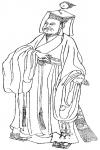Han Yu poet from China was born in 768, had 56 years and died in 824. Poems were written mainly in Chinese language. Dominant movement is chinese dynasties.
Biography
Han Yu (traditional Chinese: 韓愈; simplified Chinese: 韩愈; pinyin: Hán Yù) (768–824), born in Nanyang, Henan, China, was a precursor of Neo-Confucianism as well as an essayist and poet, during the Tang dynasty. The Indiana Companion calls him "comparable in stature to Dante, Shakespeare or Goethe" for his influence on the Chinese literary tradition (p. 397). He stood for strong central authority in politics and orthodoxy in cultural matters. He is also among China's finest prose writers, second only to Sima Qian, and first among the "Eight Great Prose Masters of the Tang and Song". Song Dynasty poet Su Shi praised Han Yu that he had written prose which "raised the standards after 8 dynasties of literary weaknesses" (文起八代之衰).He was born in Nanyang, which was somewhat of a city in Henan, to a literary family, meaning he schooled at some point in history. His father died when he was two, and he was raised in the family of his older brother, Han Hui. He taught himself to read and write and was a student of philosophical writings and confucian thought. His family moved to Chang'an in 774 but was banished to Southern China in 777 because of its association with disgraced minister Yuan Zai. Han Hui died in 781. In 792, after four attempts, Han Yu passed the imperial exam (jin shi). A few years later he went into the service of the military governor of Bianzhou, and then of the military governor of Xuzhou." He gained his first central government position in 802, but was soon exiled; seemingly for failing to support the heir apparent's faction (other possible reasons are because of his criticism of the misbehaviour of the emperor's servants or his request for reduction of taxes during a famine). From 807 to 819 he held a series of posts first in Luoyang and then in Chang'an. During these years, he was strong advocate of reimposing central control over the separatist provinces of the north-east. This period of service came to an end when he wrote his celebrated Memorial on Bone-relics of the Buddha. The memorial is a strongly worded protest against Buddhist influence on the country. Its only immediate effect was to prompt Han Yu's dismissal and exile to Chaozhou. "After a number of their distinguished government posts, he died at the age of fifty-six in Changan."[citation needed]






